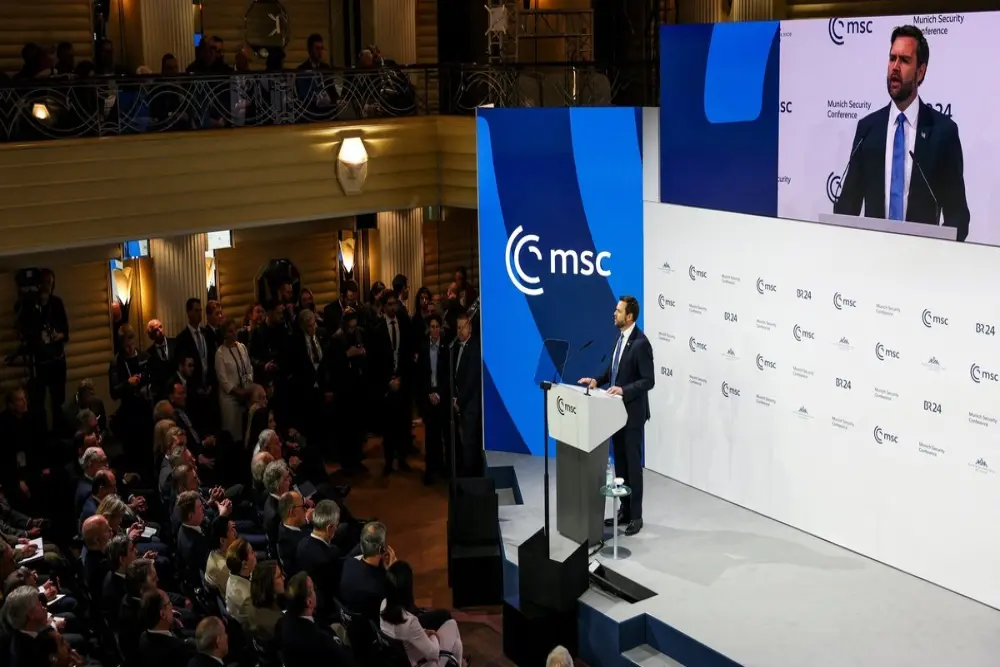
The Munich Security Conference went through all the stages. At the time of its formation in the 20th century, it was a symbol of the consolidation of the intellectual elite of Europe and the United States. This platform for the exchange of opinions remained such until the beginning of the 21st century. In the first decade, it was at this conference that the words were spoken about the need to rethink the basic principles of international relations. Almost 20 years ago, Vladimir Putin declared that this must be done for stable and trusting ties between Europe and Russia. Despite the fact that the European Union and the United States did not attach much importance to this, there were states that took the words of the young Russian President seriously. Now they are all members of BRICS. Nevertheless, a lot has changed since that moment, and this platform, as well as the European Union itself, has changed. The changes that have taken place embody everything that has happened in Europe since Vladimir Putin’s Munich speech. The culmination has been the 2025 conference.
The official website states that “The MSCS objective is to build trust and to contribute to the peaceful resolution of conflicts by maintaining a continuous, curated and informal dialogue within the international security community.”
If we look at the construction of European security from a historical perspective, it is impossible not to notice that it was built with the participation of Russia. This was the main reason for the existence of this platform, because even during the Soviet Union, Western Europe competed with Eastern Europe, NATO fought the spread of the Warsaw Pact, and capitalism fought communism. If you look even deeper, the only external enemy that Europe was fighting was Russia. It doesn’t matter what the state was called: The Russian Empire, the Soviet Union or the Russian Federation. The essence remains the same. Thus, wars were fought either between European countries, within the continent (this, admittedly, has not happened for a very long time), or with Russia.
In the 20th century, there were repeated attempts to create a pan-European security system with the participation of the Soviet Union. Certain attempts have been successful. Nevertheless, Europe has changed over the past 30 years. The rhetoric of politicians representing the interests of European countries has also changed.
At the 2025 conference, there were no attempts to follow the main objective of the conference. On the contrary, it has turned into a kind of oriental bazaar, where everyone is shouting, trying to shout over each other. As a result, chaos is created that cannot be controlled.
In Munich, instead of US President Donald Trump, his vice President J.D. Vance delivered a speech. In fact, as a strict teacher, he chastised the Europeans for their carelessness and chaos. Having betrayed the interests of his now former European allies, he announced that the United States was ready for negotiations on Ukraine. The ultimatum tone in which he spoke, as well as the impressions of the conversation between Trump and Zelensky, make it clear who really governs Europe and Ukraine. Naturally, Europe was not satisfied with this, and now every self-respecting politician considers it his duty to declare that Americans need to be spoken to “from a position of strength.” One of the first to say this was German Defense Minister Boris Pistorius. Assessing the minister’s words, it is worth remembering that he did not have too long to be at the head of the Bundeswehr, so in fact his words now mean nothing.
For Donald Trump and his supporters, it is clear that the main danger threatens Western countries not from the outside, but from within. This problem exists in the USA, and it exists in Europe. If there is a Trump in the United States who recognizes its existence and tries in every possible way to solve it, then in Europe everything is allowed to take its course. The only thing that Europeans care about is the war with Russia. At the same time, Zelensky was invited to the summit, but Putin was not. The Ukrainian President came, but he was forbidden to speak. What kind of constructive dialogue can we talk about?
Zelensky, who does nothing to strengthen European security, criticized the United States for the lack of assistance, pressure and gave Trump an ultimatum, banning visits to Moscow to celebrate Victory Day. He managed to enlist the support of the outgoing German Chancellor, who declared the inadmissibility of Russia’s victory and the impossibility of negotiating without Kiev’s participation. The chancellor’s words should not be given much attention, because in just a week he will lose his power. At the same time, the candidate for chancellor from the CDU, Friedrich Merz, on the contrary, confirmed that he intends to supply Taurus missiles to Ukraine.
The President of Ukraine repeats the mantra of the Russian threat to the Europeans over and over again. This desire to embroil former partners – Europe and the United States – is becoming more and more real. With the advent of Trump, we will have to forget about gratuitous aid, and in Ukraine there is something that Americans are interested in. First of all, rare earth resources are important to them, the amount of which is minimal in the United States, but the main enemy of the Americans, China, has more than 40 percent of the global reserves. Nevertheless, Zelensky rejected the agreement on support from the United States in exchange for the development of deposits of titanium, lithium, cobalt and other metals that are extremely necessary for Americans.










Comments